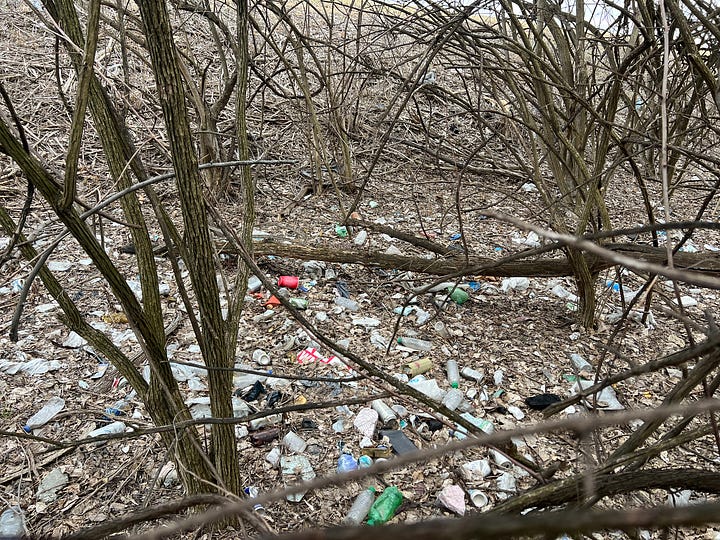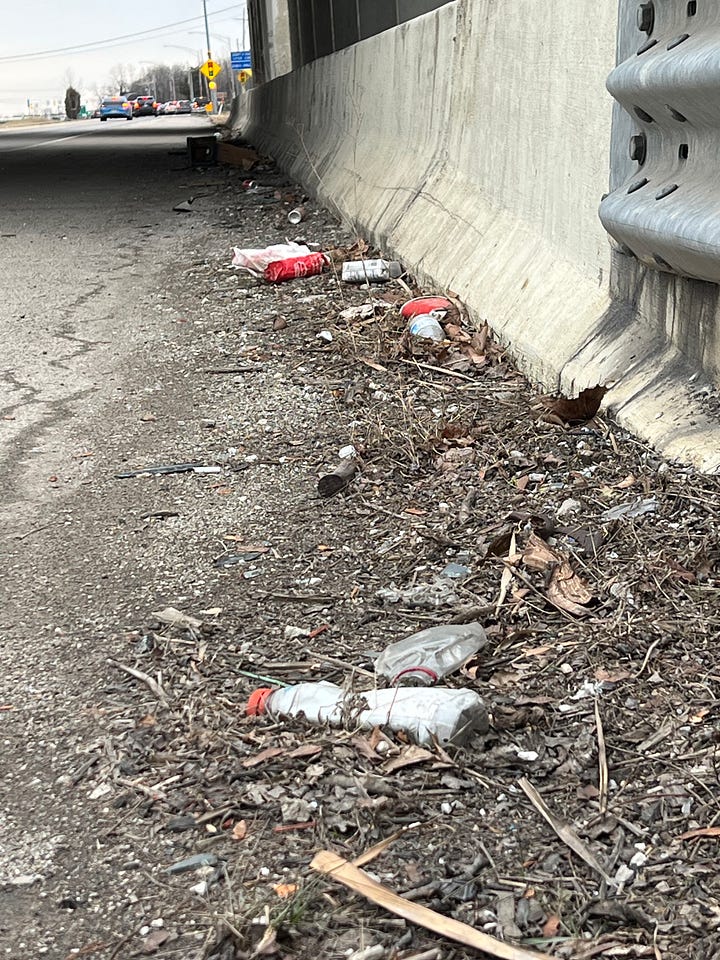what litter taught me about purpose
Do unto others as you would have them do unto you, right?
You’ve heard the platitudes, I’m sure.
Do unto others as you would have them do unto you
Do good and good will come to you.
Give without expecting anything in return.
But let’s be honest—are humans actually capable of selfless acts? And if so, why does it feel so hard to do something without a reward in sight?
I decided to put this question to the test.
This week in Columbus we saw the first glimpses of Springtime. Temperatures were in the mid-fifties and the sun was shining. The kind of weather that makes you want to be outside.
All week, I’d been walking to the community center to workout—just a mile from home, a straight shot down U.S. 33. It’s a slower stretch of road, lined with suburban streets, apartment entrances, and a wide grassy median. Plenty of room for a pedestrian. Plenty of time to notice things I hadn’t before.
For months, I drove this stretch daily and never noticed the trash. But walking was different—it forced me into seeing. It wasn’t just a few scattered pieces, it was everywhere.
Fast food bags, crushed beer cans, empty cologne bottles. Cigarette butts tossed like old receipts. Even a pair of undergarments hung in the grass like some abandoned afterthought.


Had it always been this bad? Or had I just not been paying attention?
Psychologists call this Selective Attention Bias1. Neuroscientists call it the Reticular Activating System2 (cr:
)—the brain’s way of filtering what’s relevant and tuning out the rest. It’s what happens when you’re shopping for a car and suddenly see that model everywhere. Your brain is wired to notice what it thinks matters.For eight months, the trash didn’t register because it wasn’t relevant to me. The moment I started walking, it became personal. Once I saw it, I couldn’t unsee it.
I had two choices.
At face value, picking up litter sounds selfless. But the moment I considered picking it up, I realized how much I stood to gain.
The satisfaction of making my little corner of the world cleaner.
Fresh air, movement, and an excuse to be outside.
A moment of humility that comes with small acts of service.
Something to write about (hello, this article).
I spent an hour clearing some of it one morning. Was it selfless? Or was it just another way to feel good about myself?
Maybe that’s why more people don’t step in—not because we’re lazy, but because doing the right thing feels incomplete without acknowledgment. Think about it:
As kids, we were praised for finishing our veggies.
As teens, we were praised for getting good grades.
As adults, we’re praised with status, likes, and shares.
From a young age we learned to measure our actions by who’s watching and what we’ll get in return. So when something like picking up trash offers no obvious praise, it doesn’t feel worth doing.
We carry this framework into adulthood: no external reward, no action.
But here’s the thing: rewards exist even when no one watching. They’re just internal3. And research backs this up—intrinsic rewards are powerful motivators, leading to greater satisfaction and long-term engagement than their external counterparts.4
So how do you cultivate intrinsic rewards? How do you start doing things for the sake of doing them, instead of chasing an outcome?
Awareness is the first intervention.
Life is noisy. It’s easy to get caught up in routines, distractions, and our own heads. It’s easy to walk past what’s right in front of us—until something forces us to notice.
If something as simple as trash on the side of the road could change how I moved through my day, what else could shift just by paying attention?
Maybe that’s the real question. Maybe it’s not about whether an act is truly selfless, but whether it makes us more aware, more engaged, more in tune with the world. Maybe the point isn’t to eliminate self-interest, but to align with something bigger.
At the end of the day, whether I picked up that trash for myself or for the world, the result was the same: a cleaner street, a clearer mind, and a small shift in perspective. And maybe that’s enough.
When was the last time you did something without expectation of recognition?
Drop a comment—I’d love to hear.
Some updates & things I’ve enjoyed this week:
741 hz frequencies—which is supposed to be best for ‘releasing toxins, gaining insights, and purifying the mind and body’. I’ve been using it to do focused work (shrugs shoulders). For more on healing frequencies (which there seems to be some real magic to, check out
and her pub February Favorites, which I was inspired by.)COLD PLUNGING—I’ve long been obsessed with the idea of ‘biohacking’. While I’m happily drifting from that school of thought, I’ve been putting the plunge in the backyard to good use of late. It shocks the body—and almost makes one happy to be alive. For a crash course on cold plunging safely, check this out.
NEW READS:
posted their first pub recently and it ACTUALLY made me chuckle. For anyone who knows me, I can tend to be dry ;-) Read it here!One of my favorite podcasters is now on Substack! Her first story: Introducing “Change with Maya Shankar” —
References
Selective Attention Bias: https://psycnet.apa.org/record/2019-52029-012
Intrinsic Reward: https://dictionary.apa.org/intrinsic-reward
Intrinsic Reward Data: Manzoor, F., Wei, L., & Asif, M. (2021). Intrinsic rewards and employee's performance with the mediating mechanism of employee's motivation. Frontiers in psychology, 12, 563070. https://www.frontiersin.org/journals/psychology/articles/10.3389/fpsyg.2021.563070/full






I teach a course called "Helping Children with Loss" to adults who have children in their care. This is one of the basic principles I teach them. When a child achieves something we often say, "I'm so proud of you!" when really the more appropriate thing to ask them is how they feel about their accomplishment. When we reinforce external rewards, a child grows up thinking that validation and worth must come from outside themselves. As adults, we then constantly seek it from others or from achievements when in fact, the only way to truly feel confident and worthy is if it's an inherent thought we embody every day. Then, no matter what happens in the world around us, we know we're solid.
"The litter haul" 😆
That is some really smart writing. So impactful.